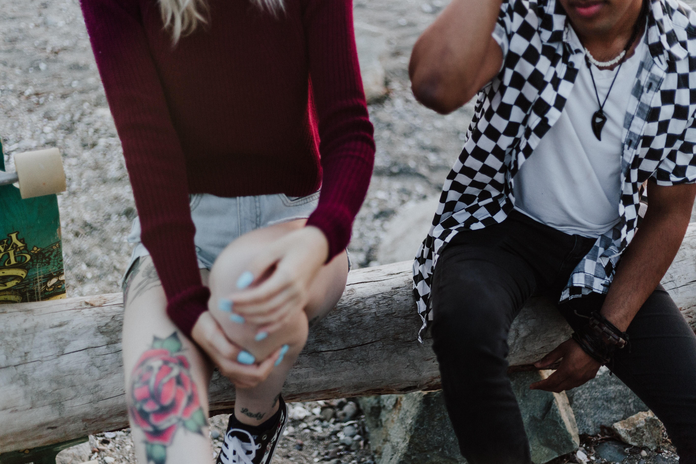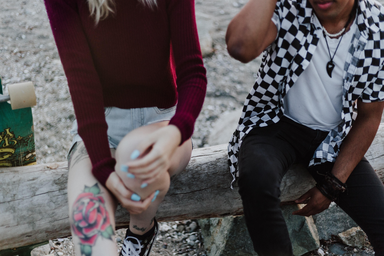This may come as a surprise to some, but members of oppressed minority groups are no strangers to perpetuating hatred. No, I’m not talking about “reverse racism” or “The War On Christmas” or any other fabled plagues made up by people who think Fox News is a reliable source of information. I’m talking about the active upholding of anglo-centric, heteronormative, cisnormative values that non-oppressed groups already enforce upon minorities. This problem is one that runs rampant in the queer community, especially the issues of biphobia, transphobia, and racism. You’d think that many would have an “all in this together” mentality, especially since many members have faced copious amounts of bigotry themselves. Sadly, that is frequently not the case.
Bi/Panphobia is the active identity erasure and prejudice against those who are attracted to more than one gender. People who identify as bisexual frequently face a slew of verbal abuse from others, calling them things such as greedy, liars, experimenters, cheaters, sluts, or people who are “just hiding the fact that they’re gay.” Biphobia isn’t exclusive to straight people, however. Many lesbian women refuse to date bisexual women simply due to the fact that they’re attracted to/have slept with men (aka, they’re not “gold star lesbians” which is funny because, well… bisexuals don’t identify as lesbians in the first place), and bisexual men are frequently stigmatized by both genders, who see them as a “gay man in disguise.” These stereotypes and misconceptions are especially harmful when it comes to mental health. According to the Human Rights Campaign, bisexual identifying individuals are likely to experience mental health issues at higher rates than lesbian and gay identifying individuals, and according to the Bisexual Resource center, “approximately 40 percent of bisexual people have considered or attempted suicide, compared to just over a quarter of gay men and lesbians” (HRC.com). Those numbers were even higher among bisexual identifying individuals of color, transgender/genderqueer bisexuals, and disabled bisexuals.
Transphobia is also an enormous issue among the queer community. The entire queer liberation movement in the United States happened because of transgender women of color, and yet, trans people are arguably some of the most stigmatized members of the community. The early activists of the Stonewall movement, such as Marsha P. Johnson and Sylvia Rivera, often stated that they did not feel welcome amongst other queer folk in this movement that they largely helped to create. Many trans and genderqueer people often feel this sense of alienation even today amongst other members of their community, especially with the rise of radical internet communities such as Trans-Exclusionary Radical Feminists (TERFs for short) and anti-trans protests at supposedly inclusionary spaces such as Pride parades and festivals. Many cisgender members of the queer community refuse to acknowledge and actively participate in the erasure of transgender identities, especially against transgender women, who many (wrongly) believe to be men in disguise; looking to uphold patriarchal values and infiltrate queer spaces. Again, this sort of hatred and misinformation leads to higher numbers of mental health issues/suicidal tendencies among trans identifying individuals.
Racism is another issue that the queer community is frequently guilty of, especially among white gay men. Online dating can be especially difficult for queer gay men of color, as they are often fetishized or simply cast aside by white gay men due to their race. Many white gay men on Grindr, a popular gay dating/hookup app, have bios sporting slogans such as “asians leave me alone” or “all blacks, keep moving cuz I ain’t interested unless u can prove not all blacks are the exact same, mkay” (both of these are unfortunately real bios, by the way. Direct quotes. No exaggeration). Many of these men, when confronted with their heinous behavior, use “personal preference” as an excuse, and profusely deny any sort of racism involved. In addition, a recent survey from Stonewall and Yougov showed that almost 51% of queer people of color in Britain reported experiencing racial prejudice/discrimination from another member, or multiple members of the queer community, and Gay Star News reports that those numbers jump to almost two thirds when just focused on black queer identified people. Many have tried to gloss over this issue, such as The Washington Post, stating that while there is discrimination within the community, there is even more outside of it, so in their eyes that makes the queer community less racist than their heterosexual counterparts. Racism is racism, period end of story, no matter who is perpetuating it. Brushing the issue under the rug will do nothing to solve it.
The queer community already faces enough prejudice, hatred, and violence from outside of our little group. For some, this group is all they have: those who have been kicked out of their homes, ostracized by their family and friends, and have even faced death. Our community needs to examine and evaluate its inner prejudices in order to move past them. Let’s face it, we all have inner prejudices that have been ingrained into the deepest parts of us by our environment, by our society as a whole. It isn’t right, but it’s unavoidable, everybody has prejudices, and denying and ignoring them isn’t going to help anything. We need to confront this, stop gatekeeping and identity policing, learn and internalize our deep, beautiful history, and keep working to make sure the queer community is a welcoming place for everyone. In a world where so many doors are slammed in our faces, let’s lay out a welcome mat. For everyone.


